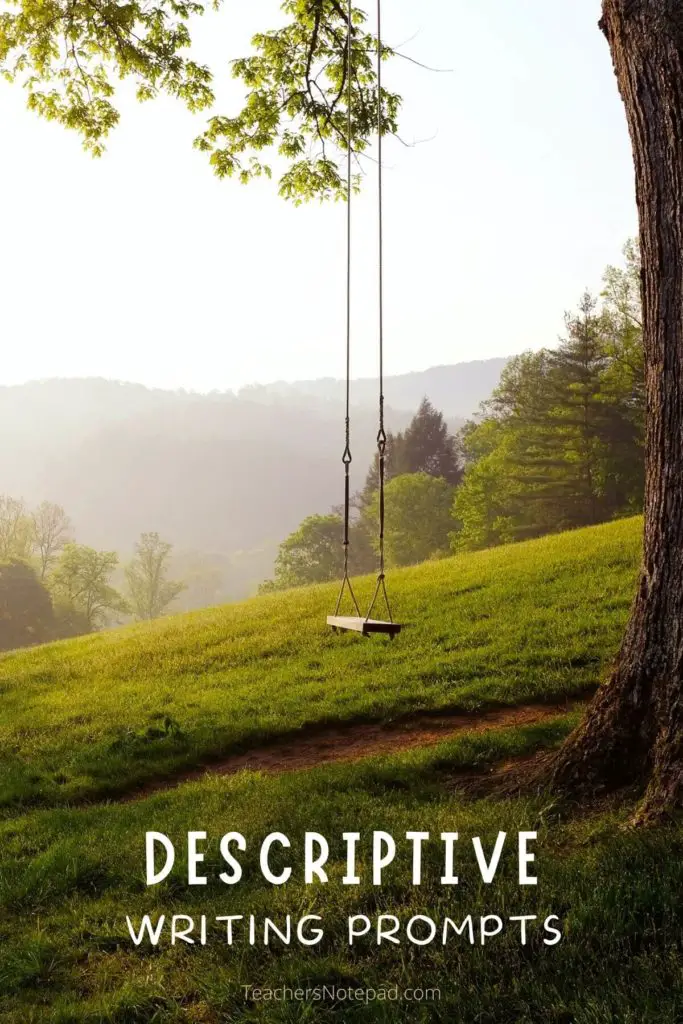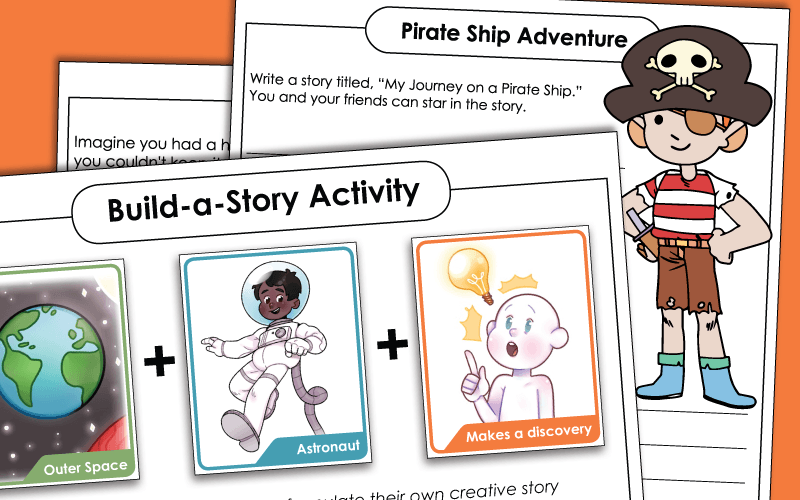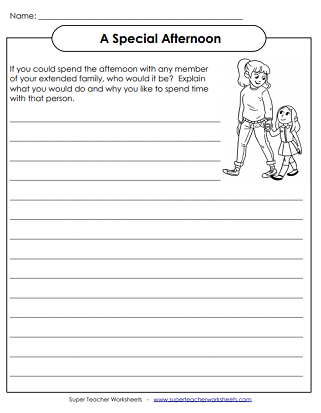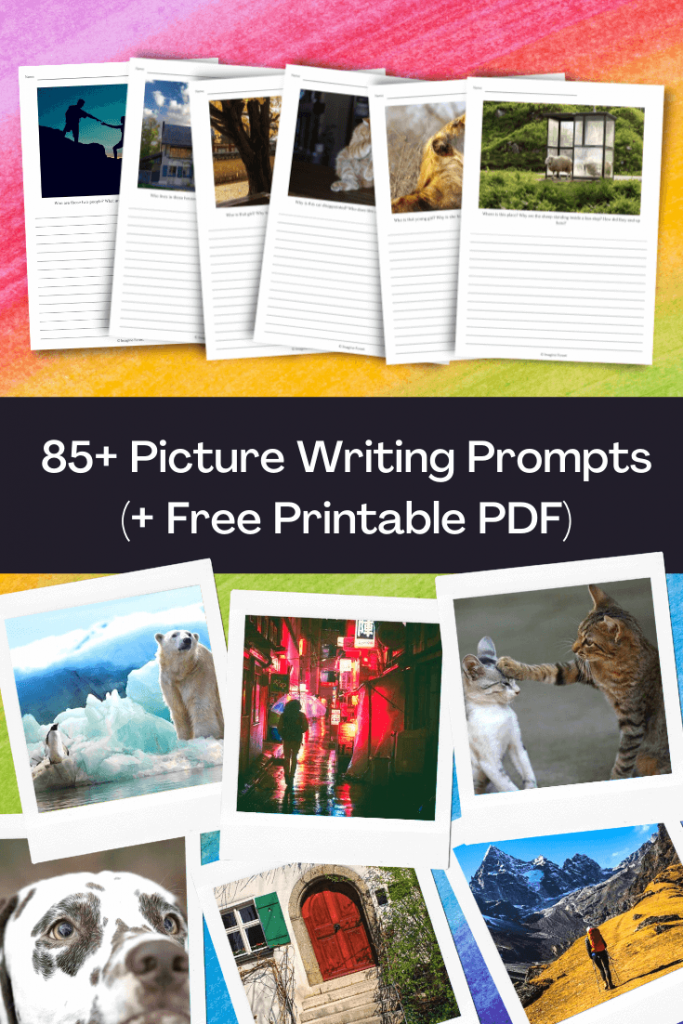

37 Descriptive Writing Prompts
Descriptions are what make books worth reading, movies worth watching, and adds so much life into stories and cultures around the world.
Adding description helps readers get more involved with your writing and better feel the emotions you are portraying. So let’s dive in!
How to use:
These prompts are aimed to get you writing with descriptive words instead of reaching a specific word count.
Really feel what you are writing and explain every part of it that you can.
You can use flowery language and as many adjectives as you want!
There is no wrong way to use these prompts, just remember to include as much detail as you can.
The prompts:
- Write about the first memory that you have. Where were you, and what were you doing?
- Describe a family member in detail. What is their personality like? How do they dress?
- Write about your first pet. If you have never had a pet, invent one.
- Do you think description is important when it comes to writing?
- Describe your best friend. How did you meet? What do they look like?
- Describe yourself. What are you like first thing in the morning?
- Describe your bed. What color are your sheets and blankets? How many pillows do you have?
- Write about a memorable time at the amusement park. If you haven’t been, make up a story.
- Describe your favorite food in detail. How is it made?
- Describe your perfect day. Include the weather, what you wear, and what activities you choose.
- Describe your favorite video game and why you love it. If you don’t have one, choose your favorite movie.
- Write about your favorite outfit. Make sure to include every part of the outfit, including colors!
- Describe your least favorite meal. Make sure to include the ingredients as well as why it’s your least favorite.
- Describe your favorite drink. Is it hot or cold? What color is it?
- How would you describe a rainy day? To include as much detail as possible, think of your five senses and write something for each.
- How would you describe a perfect piece of pizza? Be sure to include the toppings and where you got it from.
- Write about a day at the beach using all five senses to add descriptive detail.
- How would you describe Thanksgiving to an alien? Make sure to discuss food and festivities in detail.
- Write a descriptive paragraph about your favorite dessert. How does it taste?
- Describe your typical day of school or work.
- Write about a trip to the zoo and describe what you see and hear.
- Write about your favorite color and things that are that color.
- How would you describe a field of grass?
- Pick your favorite teacher and describe them.
- Describe what it is like on a sunny day using all of your senses.
- Use descriptive words to tell someone what a sunset is.
- Use descriptive words to explain a sunrise.
- What is something that makes you happy? Describe it.
- Describe what it is like to feel sleepy.
- Describe how music makes you feel, and what type of music you listen to.
- Describe your own face and what makes you unique.
- Describe your favorite accessory and where you would wear it.
- Pick a classmate and describe their best qualities.
- What do you think the future will be like? Use as many adjectives as you can.
- Imagine that you wake up in the hospital. Describe what you do when you open your eyes.
- Describe your ideal snow day.
- Describe your typical trip to the grocery store with as much detail as possible.
Looking for more?
Our website is full of free, unique resources for our readers and writers to use and share! If you haven’t already, you need to take a look at some of the thousands of free writing prompts and other resources we’ve got for you here!
Have a go at writing about somber thoughtful topics like Memorial Day , or delve into the fascinating worlds of creatures by writing about owls or insects .
If you have any suggestions, comments, or questions for us, please get in touch with us, we’d love to hear from you! 🙂
Thanks and see you again soon – we’re releasing new resources for you every day!


Addition (Basic)
Addition (Multi-Digit)
Algebra & Pre-Algebra
Comparing Numbers
Daily Math Review
Division (Basic)
Division (Long Division)
Hundreds Charts
Measurement
Multiplication (Basic)
Multiplication (Multi-Digit)
Order of Operations
Place Value
Probability
Skip Counting
Subtraction
Telling Time
Word Problems (Daily)
More Math Worksheets
Reading Comprehension
Reading Comprehension Gr. 1
Reading Comprehension Gr. 2
Reading Comprehension Gr. 3
Reading Comprehension Gr. 4
Reading Comprehension Gr. 5
Reading Comprehension Gr. 6
Reading & Writing
Reading Worksheets
Cause & Effect
Fact & Opinion
Fix the Sentences
Graphic Organizers
Synonyms & Antonyms
Writing Prompts
Writing Story Pictures
Writing Worksheets
More ELA Worksheets
Consonant Sounds
Vowel Sounds
Consonant Blends
Consonant Digraphs
Word Families
More Phonics Worksheets
Early Literacy
Build Sentences
Sight Word Units
Sight Words (Individual)
More Early Literacy
Punctuation
Subjects and Predicates
More Grammar Worksheets
Spelling Lists
Spelling Grade 1
Spelling Grade 2
Spelling Grade 3
Spelling Grade 4
Spelling Grade 5
Spelling Grade 6
More Spelling Worksheets
Chapter Books
Charlotte's Web
Magic Tree House #1
Boxcar Children
More Literacy Units
Animal (Vertebrate) Groups
Butterfly Life Cycle
Electricity
Matter (Solid, Liquid, Gas)
Simple Machines
Space - Solar System
More Science Worksheets
Social Studies
Maps (Geography)
Maps (Map Skills)
More Social Studies
Mother's Day
Father's Day
More Holiday Worksheets
Puzzles & Brain Teasers
Brain Teasers
Logic: Addition Squares
Mystery Graph Pictures
Number Detective
Lost in the USA
More Thinking Puzzles
Teacher Helpers
Teaching Tools
Award Certificates
More Teacher Helpers
Pre-K and Kindergarten
Alphabet (ABCs)
Numbers and Counting
Shapes (Basic)
More Kindergarten
Worksheet Generator
Word Search Generator
Multiple Choice Generator
Fill-in-the-Blanks Generator
More Generator Tools
Full Website Index
Creative Writing Prompts
Lots of creative writing worksheets with prompts that spark students' imagination

Logged in members can use the Super Teacher Worksheets filing cabinet to save their favorite worksheets.
Quickly access your most used files AND your custom generated worksheets!
Please login to your account or become a member and join our community today to utilize this helpful feature.

Build-a-Story Activity

Proofreading Wheels
Related pages on super teacher worksheets.
Write fun stories to go along with the cartoon pictures.
Worksheets to practice writing dates, writing names, letter-writing, and more.
Write persuasive opinion essays on a variety of topics. Students use details to support their points of view.
Pictures of Worksheets

PDF with answer key:
PDF no answer key:

Reading & Math for K-5
- Kindergarten
- Learning numbers
- Comparing numbers
- Place Value
- Roman numerals
- Subtraction
- Multiplication
- Order of operations
- Drills & practice
- Measurement
- Factoring & prime factors
- Proportions
- Shape & geometry
- Data & graphing
- Word problems
- Children's stories
- Leveled Stories
- Context clues
- Cause & effect
- Compare & contrast
- Fact vs. fiction
- Fact vs. opinion
- Main idea & details
- Story elements
- Conclusions & inferences
- Sounds & phonics
- Words & vocabulary
- Reading comprehension
- Early writing
- Numbers & counting
- Simple math
- Social skills
- Other activities
- Dolch sight words
- Fry sight words
- Multiple meaning words
- Prefixes & suffixes
- Vocabulary cards
- Other parts of speech
- Punctuation
- Capitalization
- Narrative writing
- Opinion writing
- Informative writing
- Cursive alphabet
- Cursive letters
- Cursive letter joins
- Cursive words
- Cursive sentences
- Cursive passages
- Grammar & Writing
Breadcrumbs
- Descriptive writing

Download & Print Only $6.89
Descriptive writing prompts
Create a mental picture.
In descriptive writing, we try to create a complete mental picture of the scene for the reader. These descriptive writing prompts encourage students to write vivid descriptions.

These worksheets are available to members only.
Join K5 to save time, skip ads and access more content. Learn More
What is K5?
K5 Learning offers free worksheets , flashcards and inexpensive workbooks for kids in kindergarten to grade 5. Become a member to access additional content and skip ads.
Our members helped us give away millions of worksheets last year.
We provide free educational materials to parents and teachers in over 100 countries. If you can, please consider purchasing a membership ($24/year) to support our efforts.
Members skip ads and access exclusive features.
Learn about member benefits
This content is available to members only.
- Forgot Password?
Reading Worksheets, Spelling, Grammar, Comprehension, Lesson Plans
Descriptive Writing Prompts
Just as its name implies, descriptive writing attempts to describe a place, emotion or event so clearly that the reader is able to see and feel what is happening. While most poetry falls into the descriptive writing type, it may also be prose, such as essays or journal entries. To view the details or download the worksheets below, simply click on the title of the worksheet. They are free for you to use at home or at school. Check out all of our writing prompts .
Sorry, no worksheets matched your criteria.

12 Creative Descriptive Essay Prompts
by Suzanne Davis | Dec 12, 2019 | Writing Essays and Papers , Writing Prompts | 13 comments
“Description is what makes the reader a sensory participant in the story.” –Stephen King
Stephen King wrote about description in stories. But the same advice is correct for descriptive essays. Get your readers engaged by making them sense and connect with everything you’ve written in your essay. How can you do that? Begin with descriptive essay prompts that inspire you to write more.
Then add important details and characteristics or features about the person, place, object, or experience in your essay. The more detail and elements you add to a descriptive essay, the better it will be.
So, check out these descriptive writing topics and find the one that will work best for you.
How to Select a Descriptive Essay Prompt
Before you select a descriptive essay topic, see if you can show and not tell your readers about the characteristics, actions, and emotions in that essay.
Maybe you’ve heard writers say, “ Show Don’t Tell .” This motto is an approach some writers use to make their writing more descriptive. The word “show” means to portray or illustrate feelings and actions. And “tell” is when a writer says what the emotions and actions are.
For example, “ The black poodle snarled and growled.” (showing) vs. “The black poodle was angry and fierce.” (telling)
In the example above, the first sentence shows that the black poodle was angry because it snarled and growled. The second sentence says or tells us that the dog was angry and fierce.
Use the “ Show Don’t Tell” approach in your descriptive essay by asking these questions about the 5 senses:
- What did you see?
- What did you hear?
- What did you touch?
- What did you smell?
- What did you taste?
You probably won’t have answers to all these questions. (Or at least if you write about a mountain, I hope you can’t describe how tastes.) But write “Show Don’t Tell ” content wherever you can in your essay.
The 12 descriptive essay prompts here, give you the freedom to develop your content in different ways, and with a lot of sensory details. They are divided into 4 categories: person, place, object, and experience. Each type has 3 descriptive essay writing ideas. For each writing prompt, brainstorm how you can develop that essay.
Descriptive WritingTopics About a Person
# 1 describe the strangest person you ever met.
Strange people are easy to remember, and if you remember a different, odd, or unique person, you’ll have a lot of information you can write on. Before you choose this topic, brainstorm a few ideas about this person.
Questions to develop this essay topic : What seemed strange about this person? What characteristics did he/she possess? How did you feel about this person?

# 2 Describe a person you envied .
Envy or jealousy is a powerful emotion. When you focus on a person you were jealous of, there are reasons and characteristics for why you felt that way.
Questions to develop this essay topic: What traits or characteristics did this person have? How did that person look? How did this person act? What made you envy him/her?
# 3 Describe an inspiring friend or family member.
We remember people who inspire us. And people love to read about inspiring individuals. If you describe an inspiring person, think about the impact that a person made on you.
Questions to develop this essay topic: What did this person do that was inspiring? How did that person act toward others?
Descriptive Writing Topics About a Place
# 4 describe a spooky or haunted place ..
If you describe a scary place, include a lot of sensory details. Spooky and haunted places are memorable.
Questions to develop this essay topic: What did this place look like? Where was it located? What did you see, hear, smell, or feel at this place? Did you find someone or something that scared you? Why is this place, spooky?
# 5 Describe a place you loved as a child.
People love to know things about another person’s childhood. A great way to show who you are is to describe a place that was important to you. If you select this writing topic, make sure you remember this place well.
Questions to develop this essay topic : How did this place look? What did you do at this place? Was anyone else at this there? How did you feel about the area?
# 6 Describe a beautiful location in nature.
You could describe a mountain, body of water, campground, desert, etc. Or any other place that is outdoors and part of nature.
Questions to develop this essay topic: What did this place look like? How did you feel when you were there? Did you hear, smell, taste, or touch anything at the location? Was there anyone else with you? What did you do at this place?
Descriptive WritingTopics About an Object

# 7 Describe a lucky object.
It can be any lucky object, a good luck charm, an heirloom object, etc. Select something you believe brings you good luck.
Q uestions to develop this essay topic: What are the characteristics of this object? How is it used? What makes this a lucky object?
# 8 Describe a piece of art.
It can be a photograph, painting, sculpture, etc. There are a lot of sensory details you can include in a descriptive essay about a piece of art.
Questions to develop this essay topic: What does this work of art look? Can you touch it? If so, how does it feel? What are the emotions you have when you see this sculpture, painting, photograph, etc.?
# 9 Describe an object used in your favorite sport or hobby.
If you have a favorite sport or hobby, describe an object that is relevant to that sport. For example, if you play tennis, describe a tennis racket. Or, if you collect coins, describe a unique coin from your collection.
Questions to develop this essay topic: What are the characteristics or features of this object? How is it used? What is significant about this object? What are some sensory details you can add?
Descriptive Essay Topics About an Experience
# 10 describe the first time you drove a car or rode a bicycle..
First-time experiences are emotional and significant to people. If you haven’t driven a car or ridden a bicycle, write about another first-time experience.
Questions to develop this essay topic: What did you see, hear, touch, smell, or taste during this experience? What did you do? Were others involved? If so, what did they do? How did you feel during this experience? How do you feel about it now?
# 11 Describe a hike or special walk you took .
Do you recall a hike you took or a walk on a trail, path, or street? If so, describe that memory.
Questions to develop this essay topic: What was the place you were at like? What did you hear, see, smell, taste, or touch during this experience? What did you do? What did anyone else do?
# 12 Describe a happy memory.
Write about a happy experience you can remember clearly. This topic involves remembering what occurred and how you felt during that experience.
Questions to develop this essay topic: What made this experience happy? What happened? Who else was there? Can you describe them?
Writing a Descriptive Essay
The key to writing a descriptive essay is to show or portray to a reader the significant elements of a person, place, object, or experience. So, select an essay topic that you connect with, and develop it with sensory details. If you do this, you’ll achieve what Stephen King does in his writing and “make the reader a sensory participant.” When you do that, your readers will want to keep reading until the end.
Make them wish your essay continued so that they could read even more!
So which descriptive essay prompt inspires you? And if you want more creative writing prompts, check out my blog post, “13 Thought-Provoking Personal Narrative Prompts” https://www.academicwritingsuccess.com/13-thought-provoking-personal-narrative-prompts/.
Suzanne,I enjoy reading your articles. Loved your sense of humour ‘(Or at least if you write about a mountain, I hope you can’t describe how tastes.)’. I tried to share this article in my Pinterest account, but somehow something went wrong and it did not allow me to do it.
I’m glad you enjoyed the article. I do try to be funny whenever I can. I’m having a problem right now with my article pinning. I’m working on it.
Loved the “show, not tell” explanation. It really made sense. I’m a visual learner, so I really liked the visual for the 12 descriptive essay prompts in both written form and as a image. You gave me a lot of good ideas for starting a descriptive essay!
Terri, I’m glad you liked my infographic for the post. I love designing visual images for articles. Let me know if you use one of the descriptive essay prompts. I’d love to know how it worked for you.
Excellent. I like the sensory detail questions. It brings the writing to a new level.
Raven, thank you. Sensory details are great for developing writing. They really help writers of all ages.
Nice article, Suzanne. I love using prompts with my students. I might be nervous of the prompt “Describe the strangest person you ever met.” For many of my students I would have the starring role in that one! 🙂 Using the basic five senses to help students expand upon their writing is also very good. So many students write one sentence and then get stuck. Prompting questions can really help them broaden their thoughts.
Ron, thank you. I might be nervous about the “strangest person you ever met” prompt too. But, I’m hoping there are other strange people students could write about too!
Love these! In this generation of “just getting the point across”, it is so difficult to get some students to be descriptive in their writing.It would be hard for any student to not be descriptive using these prompts. When working on writing with students, I always use the five senses to show them how their writing will be more interesting to any reader when it is descriptive. Thanks for sharing!
Thank you,Randy. Descriptive writing is a challenge, but finding a good descriptive writing prompt and using the 5 senses makes a huge difference.
Also, that is a great quote by Stephen King!
Hi Suzanne! Excellent post! I love the creative prompts. They’re helpful, whether one is writing fiction or non-fiction.
You have a great site. Will stop by again. I know I’ll learn lots here.
P.S. Thanks for stopping by my site. I appreciate your feedback.
Hi Nadine, Thanks so much. I am glad you stopped by and checked out my post on descriptive writing prompts. I love prompts because they can make you think about writing in different ways. And sometimes I just need help getting started. I enjoyed your post on writing spaces. I’ll be visiting your site again.
Session expired
Please log in again. The login page will open in a new tab. After logging in you can close it and return to this page.
Privacy Overview
- Image Prompts
85+ Picture Writing Prompts For Kids (+ Free Printable)
A picture is worth a thousand words. So how many words can you write for these 85 picture writing prompts for kids and grow-ups alike! Pictures, whether something as simple as an apple or as complex as an action scene can spark the imagination in more ways than one.
Of course, when looking at pictures you can take the literal route, and describe whatever you see in front of you. Or you can explore your imagination, and think about the ‘What Ifs..’ of a picture. What if that person is actually upset? What if this picture is of a broken family? What if the world looked like this years ago? A picture can have so many hidden meanings and can hide so many secrets. The slightest detail could mean everything. Just imagine you’re a detective solving a crime from one picture alone. Examine every detail, write it down and think why? Only then can you fully understand a picture.
For more inspiration take part in our daily picture writing prompt challenge . Each day you will be given a new picture prompt to write about.
Picture Prompt Generator
In this post, we have included a mix of simple pictures, story picture prompts, photographs, fantasy images and even some action-packed images.
You can find the complete list of our picture writing prompts below. We’ve also created a smaller PDF version that includes 30 random picture prompts. Download the printable PDF here .
You might also be interested in the following posts:
- 30 Christmas Pictures To Get You Writing ‘Tis Jolly Season
- 25+ Halloween Image Prompts For Mastering Horror Stories
- How to Use Image prompts To Inspire You
150 Picture Prompts To Inspire
Over 85 picture prompts for creative writing, story-telling and descriptive writing assignments:

How to Use these Prompts
Picture prompts are the perfect writing stimulus especially when you hit writer’s block . Here are a number of ways you can use these picture writing prompts to spark your imagination:
- Descriptive Writing: Directly describe everything you see in extreme detail. You could even go beyond the physical appearance of things, and explore your other senses, such as smell, hear, feel and taste.
- Story-Telling: Pick just one image, and tell a whole story based on this one image.
- Story Starter: Similarly you can pick one image, and use it as the starting place of your story.
- Collaborative Story-Telling: In a group of 5 – 7 students, each student can have a random picture. The first student uses their picture as the story starter, and then the next student continues the story based on their own image. Keep going until the final student ends the story.
- Idea Generation: Pick one image and try to think of at least 3 story ideas related to that one image.
- Daily Writing Challenge: Give your students 7 images, and tell them to write a description for each image every day.
These are just some ways to use images as writing prompts. You can also check our post on 8 fun story-telling games using image prompts for more ideas. Did you find our picture writing prompts useful? Let us know in the comments below!

Marty the wizard is the master of Imagine Forest. When he's not reading a ton of books or writing some of his own tales, he loves to be surrounded by the magical creatures that live in Imagine Forest. While living in his tree house he has devoted his time to helping children around the world with their writing skills and creativity.
Related Posts

Comments loading...

50 Writing Prompts For High School Sophomores [PDF Included]
Greetings, young scribes, and literary daredevils! Are you ready to soar through the clouds of creativity and dive into the depths of your imagination? Well, grab your feather quills and boundless journals because we’re about to embark on a whimsical adventure of writing prompts designed specifically for high schoolers and sophomores!
Buckle up, because these prompts are as quirky as a unicycling giraffe, as imaginative as a time-traveling taco, and as unexpected as a disco-dancing dinosaur! So let’s unleash your inner bard, and let the words flow like a river of pure creative genius!
Unique and creative writing prompts for sophomores
Writing prompts can be incredibly helpful for both experienced and inexperienced writers. They provide a starting point for your writing, giving you a topic or idea to build upon. Furthermore, they can also be used in many creative writing activities. So, here’s a list of 50 creative writing prompts to help young sophomores experiment with their creativity!
- Write a story about a time traveler who goes back in time to prevent a tragedy.
- Imagine a world where animals can talk. Write a story about a young girl who befriends a talking horse.
- Write a story about a young hero who embarks on a quest to save a magical kingdom from an evil sorceress.
- Imagine a world where everyone has superpowers. Write a story about a young girl who discovers her own unique powers.
- Write a story about a young boy who must find the courage to stand up to a bully.
- Imagine a world where robots rule. Write a story about a young girl who teams up with a rogue robot to take down the oppressive government.
- Write a story about a young girl who is transported to a magical world filled with talking animals and enchanted forests.
- Imagine a world where people can control the weather. Write a story about a young boy who must save his village from a dangerous storm.
- Write a story about a young girl who must use her wit and cunning to survive in a post-apocalyptic world.
- Imagine a world where the dead can be brought back to life. Write a story about a young boy who must decide whether to bring his best friend back from the dead.
- Write a story about a young girl who must navigate the treacherous waters of high school politics.
- Imagine a world where everyone can read minds. Write a story about a young boy who must learn to control his thoughts in order to protect his secrets.
- Write a story about a young girl who discovers a hidden garden filled with magical creatures.
- Imagine a world where time moves backward. Write a story about a young boy who must navigate his way through the backward timeline in order to save the future.
- Write a story about a young girl who must overcome her fears in order to save her friends from a monster.
- Imagine a world where the government controls people’s dreams. Write a story about a young boy who must resist the government’s control and find his own path.
- Write a story about a young girl who must face her fears in order to find a hidden treasure.
- Imagine a world where people can control fire. Write a story about a young boy who must use his powers to stop a dangerous arsonist.
- Write a story about a young girl who must use her knowledge of science to save the world from a deadly virus.
- Imagine a world where people can fly. Write a story about a young boy who must use his powers to save his city from an aerial attack.
- Write a story about a young girl who discovers a mysterious box that has the power to grant wishes.
- Imagine a world where ghosts can be seen by the living. Write a story about a young boy who must confront a ghost from his past.
- Write a story about a young girl who must use her intelligence to solve a complex mystery.
- Imagine a world where everyone has a unique superpower. Write a story about a young boy who must use his powers to save his friends from a dangerous criminal.
- What do you believe is the role of technology in society and how can it be used Responsibly?
- Write about a time when you had to learn a difficult skill and how you accomplished it.
- What are your values and how do they guide your decisions and actions?
- Write about a book or movie that has had a lasting impact on you and why it is significant.
- How do you see yourself contributing to your community and what steps are you taking to make a difference?
- Write about a time when you had to face your fears and what you learned from the experience.
- What is the role of education in shaping the future and how can it be improved?
- Write about a friend who has impacted your life and why they are so special.
- How do you define happiness and what steps are you taking to achieve it?
- Write about a time when you had to apologize and what you learned from the experience.
- What do you believe is the importance of cultural diversity and how can it be celebrated and preserved?
- Write about a time when you had to forgive someone and why it was important.
- How do you stay motivated and maintain a positive attitude when faced with challenges?
- Write about a time when you had to be creative and what you learned from the experience.
- What do you believe is the role of government in society and how can it be improved?
- Write about a time when you had to help someone and what you learned from the experience.
- How do you balance your personal and academic responsibilities?
- Write about a time when you had to stand up for what was right and what you learned from the experience.
- What is the role of communication in relationships and how can it be improved?
- Write about a time when you had to work with a team and what you learned from the experience.
- How do you handle stress and maintain a healthy lifestyle?
- What do you believe is the biggest challenge facing society today and how would you go about solving it?
- Write about a teacher who has made a lasting impact on you and why they are so special.
- How do you define success and what steps are you taking to achieve it?
- What do you believe is the meaning of life and how do you live according to that belief?
- What is the role of community service and how can it be used to make a difference?

Writing prompts: Helping develop a daily practice
Developing a daily writing practice is a fantastic way for sophomores to boost their creativity and improve their writing skills. One of the best ways to do this is through the use of writing prompts.
Writing prompts are creative and quirky suggestions for what to write about. They can range from serious and introspective to whimsical and fantastical, and they provide a structure for daily writing that can help students develop their own writing style and voice.
For example, a writing prompt might ask the writer to imagine a world where everyone can control the elements, and then write a story about a young boy who must use his powers to save his village from a natural disaster. This type of prompt not only provides a specific topic to write about but also encourages the writer to think outside the box and be creative in their writing.
- Improves writing skills: Writing regularly can help students develop their writing abilities, including grammar, vocabulary, and sentence structure. Writing prompts can provide a starting point for students to improve their writing skills and create interesting and well-written pieces.
- Enhances creativity: Writing prompts can encourage students to think outside the box and be creative in their writing. This can help them develop their own unique voice and perspective, and also provide an outlet for exploring their imagination.
- Builds confidence: Regular writing can help students feel more confident in their writing abilities, and writing prompts can provide a supportive and structured environment for students to practice their writing.
- Encourages self-expression: Writing prompts can be a way for students to express their thoughts, opinions, and emotions. This can be therapeutic and can help students develop their self-awareness and emotional intelligence.
- Supports personal growth: Regular writing can be a reflective process that allows students to examine their own experiences and personal growth. Writing prompts can provide a structure for this reflection and help students identify areas for improvement and growth.
In short, incorporating writing prompts into a daily writing practice can be a fun and effective way for sophomores to build their writing skills, expand their creativity, and explore new and exciting ideas. So why not give it a try today! Furthermore, if you came across during a career exploration session or activity, that you wish to establish a career in writing, then these prompts can be all the more useful for a budding writer like you!
By using writing prompts, you can unlock your creativity, build your confidence as a writer, and explore new genres and styles of writing. Writing prompts can also help one overcome writer’s block and get their creative juices flowing. So if you’re looking to improve your writing, break out of a creative rut, or just have some fun, try incorporating writing prompts into your writing routine. Who knows what amazing stories, poems, or essays you’ll create!

Sananda Bhattacharya, Chief Editor of TheHighSchooler, is dedicated to enhancing operations and growth. With degrees in Literature and Asian Studies from Presidency University, Kolkata, she leverages her educational and innovative background to shape TheHighSchooler into a pivotal resource hub. Providing valuable insights, practical activities, and guidance on school life, graduation, scholarships, and more, Sananda’s leadership enriches the journey of high school students.
Explore a plethora of invaluable resources and insights tailored for high schoolers at TheHighSchooler, under the guidance of Sananda Bhattacharya’s expertise. You can follow her on Linkedin
Leave a Comment Cancel reply
Save my name, email, and website in this browser for the next time I comment.

IMAGES
VIDEO
COMMENTS
Descriptive Prompts for Elementary, Middle and High Schools. Note: Most states do not ask students to describe people, so only one prompt of this type is included in the suggested topics. Some states require that students write only a visual description and others ask students to include other senses such as feel, touch, smell, and taste.
Using specific details helps the reader to create a picture in their mind. Think about the ideas that you need to include in your writing to help the reader imagine the scene. Start by using sensory details such as seeing, hearing, touching, tasting, and smelling. Choose 1 of the prompts below and write for about 20 minutes or more.
How to use: These prompts are aimed to get you writing with descriptive words instead of reaching a specific word count. Really feel what you are writing and explain every part of it that you can. You can use flowery language and as many adjectives as you want! There is no wrong way to use these prompts, just remember to include as much detail ...
Descriptive Writing Write a description of a wood as suggested by this picture: REMINDER You must include: • a range of linguistic devices • a range of punctuation • ambitious vocabulary • varied structural features. Plan before you write. Consider what you need to include (specifically) and where you will include it; create a tick list.
Here are some routines and structures for teaching descriptive writing: The RAFT strategy encourages descriptive writing and supports writing in general by encouraging students to think through the writer's Role, the Audience, the Format, and the Topic. ReadWriteThink offers this RAFT Writing Template.; This Sense Chart (opens in a new window) — organized into sight, sound, smell, taste ...
• Should cameras on drones watch all public spaces to prevent crime, or is that a violation of privacy? • Do Americans have it too easy? Why do you
Lots of creative writing worksheets with prompts that spark students' imagination. Bravery FREE. Describe one time when you were brave. (creative writing journal) 2nd through 5th Grades. View PDF. New Sandwich. Invent a new kind of sandwich. Describe what is on it and how you would make it. (critical thinking and writing)
Descriptive Writing Writing Wings was developed under the direction of Robert E. Slavin and Nancy A. Madden, codirectors of the Success for All Foundation. ... The students are introduced to the writing prompt for the unit. They identify the important elements of the prompt, including the element that was the subject of the craft lesson. (These
These descriptive writing prompts encourage students to write vivid descriptions. Open PDF. Worksheet #1 Worksheet #2 Worksheet #3 Worksheet #4. Worksheet #5 Worksheet #6. Become a Member. These worksheets are available to members only. Join K5 to save time, skip ads and access more content.
This is showing, rather than telling. Picture prompts are a great way to reinforce this concept. You can use them for free. writing practice, or assign a finished paragraph. Picture Prompt #1. Use concrete detail to show what it would be like to be this bike racer.
So starting this week, pencil into your lesson plans a few of these fun student-approved descriptive writing prompts. Descriptive Writing Prompts. People. 1. Describe the funniest person in your family. 2. Describe your favorite teacher. 3. Describe the characteristics of a best friend. 4. Write a descriptive paragraph about a famous person you ...
Descriptive Writing Prompts. Just as its name implies, descriptive writing attempts to describe a place, emotion or event so clearly that the reader is able to see and feel what is happening. While most poetry falls into the descriptive writing type, it may also be prose, such as essays or journal entries. To view the details or download the ...
Adjectives involve the five senses, and writers who write with those descriptive, sensory words produce better work. We've put together a fun set of writing prompt slides for 2nd grade and up that are perfect for projecting as morning warmups. These are sure to prepare your students to use language to paint a picture.
Writing prompts can be difficult to understand and even harder to respond to. This handout will walk you through how to deconstruct and understand any individual writing prompt so you are prepared to work on your writing assignment. This handout will also provide you with a space to analyze your prompt in real-time. Types of Writing Responses
The 12 descriptive essay prompts here, give you the freedom to develop your content in different ways, and with a lot of sensory details. They are divided into 4 categories: person, place, object, and experience. Each type has 3 descriptive essay writing ideas. For each writing prompt, brainstorm how you can develop that essay.
Over 100 picture writing prompts for kids, plus a free printable PDF. Picture prompts are a brilliant way to spark your imagination. ... Descriptive Writing: Directly describe everything you see in extreme detail. You could even go beyond the physical appearance of things, and explore your other senses, such as smell, hear, feel and taste. ...
30 Descriptive Writing Topics & Prompts for Kids. May the descriptive writing prompts ignite the imaginations of your writers. Enjoy! Rewrite your favorite book into a short story in your own words. Write an original story using only the characters from your favorite TV show.
5.0. (248) $9.00. $8.50. PDF. This packet includes 30 photo picture prompts to be used for descriptive writing. Each photo includes a graphic organizer and 2 versions of writing paper. Students will be able to look at each "real" picture and create a descriptive story about the object in the photograph. The packet also includes general graphic ...
Microsoft Word - 10 Writing Emergency Lesson Plans RMS 6.doc. Descriptive Writing Prompts: Creating Details Ideas. Using specific details helps the reader to create a picture in their mind. Think about the ideas that you need to include in your writing to help the reader imagine the scene. Start by using sensory details such as seeing, hearing ...
improve the quality of both descriptive and persuasive writing. TASK 1 Learn the words and their meanings TASK 2 Using a thesaurus find 2-5 synonyms for each new word E.g. adroit - dexterity, nimble, deft, masterful TASK 3 Create a simile for each word that could be used in a piece of writing E.g. for 'adroit' you could use the simile ...
Students flex their descriptive writing muscles with these inspiring picture prompts! In each of these writing exercises, learners will be prompted to examine a picture and imagine that it's the first scene of a story. Young writers are then asked to use descriptive words to describe the details in the scene, using guiding questions to encourage their creative thinking. Designed for middle ...
Since fifth grade is the top grade in elementary school, should fifth graders get special privileges? If so, write in detail about one privilege you think they should get. If not, why not? Vincent van Gogh said, "If you truly love nature, you will find beauty everywhere.". Describe one of your favorite places in nature in detail.
Furthermore, they can also be used in many creative writing activities. So, here's a list of 50 creative writing prompts to help young sophomores experiment with their creativity! Write a story about a time traveler who goes back in time to prevent a tragedy. Imagine a world where animals can talk. Write a story about a young girl who ...